Teaching elementary kids to think like an entrepreneur
Students learn about cooperation, brain-storming and compete in a collegiate setting
May 10, 2018
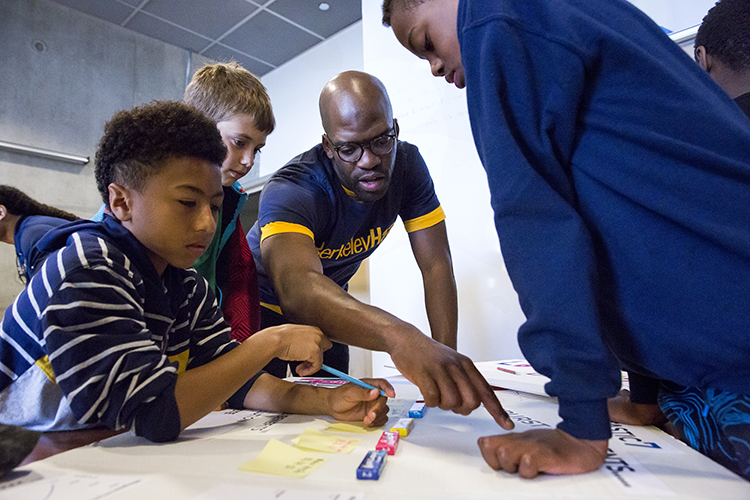
A key part of the program was teaching students to work together. Here, first year MBA student Bosun Adebaki helps his group prepare for their presentation. (UC Berkeley photos by Brittany Hosea-Small)
Ask elementary school kids to think like Berkeley-trained entrepreneurs and you get ideas like these:
School supplies that have hidden compartments for candy and snacks. A machine that can recycle paper right in your own home. Scanners that can tell when someone is being bullied and alert a teacher. Sunglasses that have built-in bluetooth speakers, a Google-glass-like screen, and, for an extra $200, night vision.
The ideas came from youngsters mentored this semester by MBA candidates at the Haas School of Business.
Every other week during the semester-long program, Haas students visited fourth and fifth graders at Emerson Elementary School in North Oakland and helped them think like entrepreneurs.
The curriculum culminated in a “Shark-Tank”-like competition — called Cheetah Tank, after the Emerson mascot — where the students came to a Haas classroom in Cal’s Memorial Stadium and, along with their mentors, presented their ideas to a panel of judges. The winning teams walked away with tickets to an A’s game or the Exploratorium.
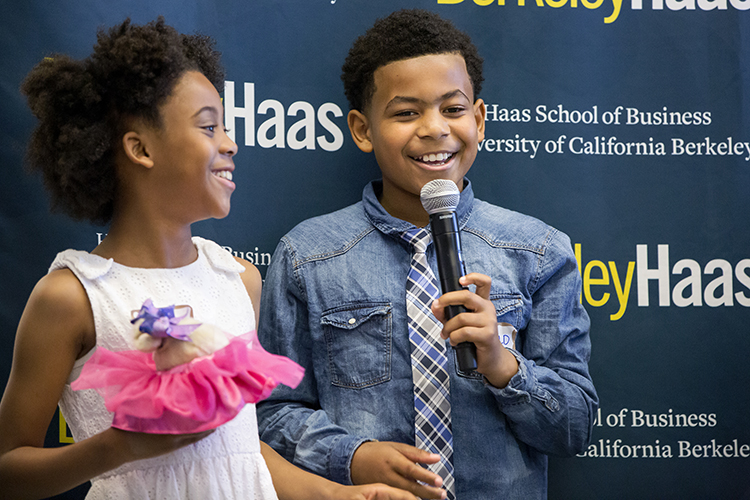
Ronald Perry, 10, and Asha Glenn, 9, present their business plan for customizable slippers. Many of the students dressed up in special outfits for their presentations.
On each school visit, a dozen Haas students — many of them members of The Consortium for Graduate Study in Management, a 52-year-old program that enhances diversity and inclusion in global business education and leadership — helped the school kids look at the world with the eyes of a UC Berkeley MBA student: What are the world’s problems, and how can they be solved in the most efficient, ethical way?
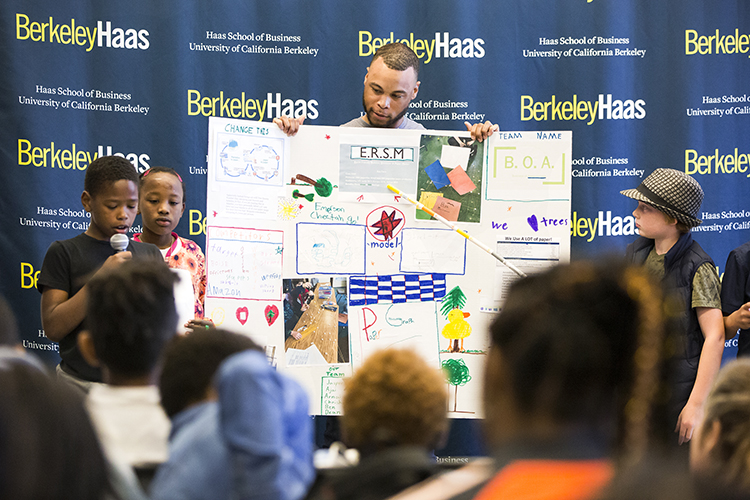
UC Berkeley MBA student Brandon White helped his group develop the idea for a in-home paper recycler.
“These kids really have so much energy, they had a ton of ideas,” said Deitrich Davidheiser, a first-year MBA student whose group, Golden Wolves, decided to market an Anti-Bullying Scanner for $250 each. The scanners would be placed in schools to watch for facial expressions that indicated someone was the victim of bullying and alert a teacher or parent. The company’s motto was to “protect, save lives and stop bullying.”
“They had this very personal idea, and I guided them to how it could be a company, a solution,” Davidheiser said.
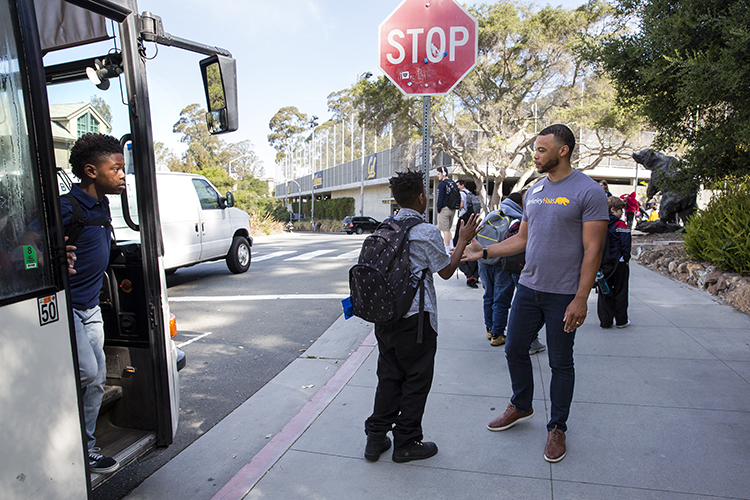
UC Berkeley MBA student Brandon White greets students as they walk off the bus. For many of them, it was their first time visiting the UC Berkeley campus.
Other companies, while still personal for 9 or 10 year olds, were less socially minded.
“We made Snack Attack because we wanted to address problems like when you’re really hungry in school, but lunch is still 30 minutes away,” said Marcus Burke, a fifth grader. School Snack Attack would sell pens and pencils with secret food compartments for $10 apiece. Another company promised to develop longer-lasting, recyclable chewing gum.
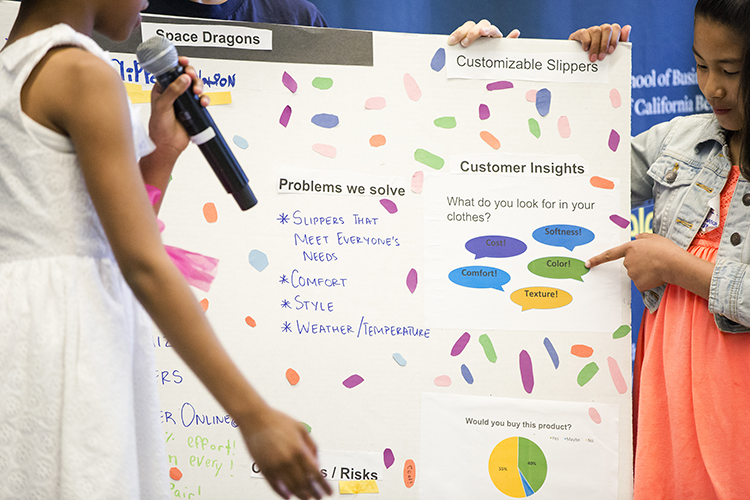
Asha Glenn (left), 9, and Lily Mendoza-Pena, 9, present their business plan for new slippers.
Marcus’s dad, Rahn, said that the training had been good for his son’s entrepreneurial spirit. “He’s got these ideas around in his head, and no one is telling him they’re impossible,” he said.
Kelsey Siegel, a fifth-grade teacher, said the mentoring and training had been stimulating for his students, who have spent much of their free time scheming together about business plans and marketing strategies.
“Just the experience of coming to a school like UC Berkeley is a new experience for a lot of these students,” he said. “They need to see how the work they do all day applies to a real-world context. They see what business school students do, that it isn’t that different from what we’re trying to do in elementary school — it is about working together.”

Emerson Elementary students Allia Amores (right) and Cecilia Fontaine practice a skit about Classy Glassy, their company selling glasses with built-in-headphones.
Allison Grill, a fourth- and fifth-grade teacher, agreed that the program had had a positive impact on her students. She gave special recognition to Bree Jenkins and Andrew Davis, two Haas MBA students who developed the Cheetah Tank program and curriculum.
“I am shocked by how committed the Berkeley students were to making this work, they came every month with a new curriculum about compromise or working together,” she said. “And the fact that a lot of these Haas mentors look liked our students, was kind of amazing. They walked in and the kids were like ‘cool, you worked in video games before you got your MBA, cool. Oh, you worked in Hollywood, cool.’ ”

The judges included Haas student Dmitriy Berenzon (right), co-founder of Polyledger, Jasmine Lawrence, the technical program manager at Facebook, and Seth Bohne who works on business strategy for the Oakland A’s.
The judges, who included an executive for the Oakland’s A’s, a Facebook program manager and a Haas student who specializes in crypto-currency, asked tough, practical questions of each team before eventually deciding to give the awards to the Classy Glassy, the group of girls behind the fancy sunglasses, and Business of Awesomeness, which developed the Earth-Friendly Reliable Shredder and Paper Machine, which for $300 would let you recycle paper in your own home.
“We need more entrepreneurs solving the big problems of the world,” Dmitriy Berenzon, a judge and Haas student, told Business of Awesomeness as they accepted their award. Classy Glassy was recognized for using a skit to emotionally market the need for their product to judges.
“It is inspiring to see how people think when they are unconstrained,” Berenzon said in an interview. “I love how they think about big problems in the world, and it is inspiring that this is what the younger generation is thinking about.”

Adebaki helped his group of students present their business plan for longer lasting gum.
Contact Will Kane at [email protected]